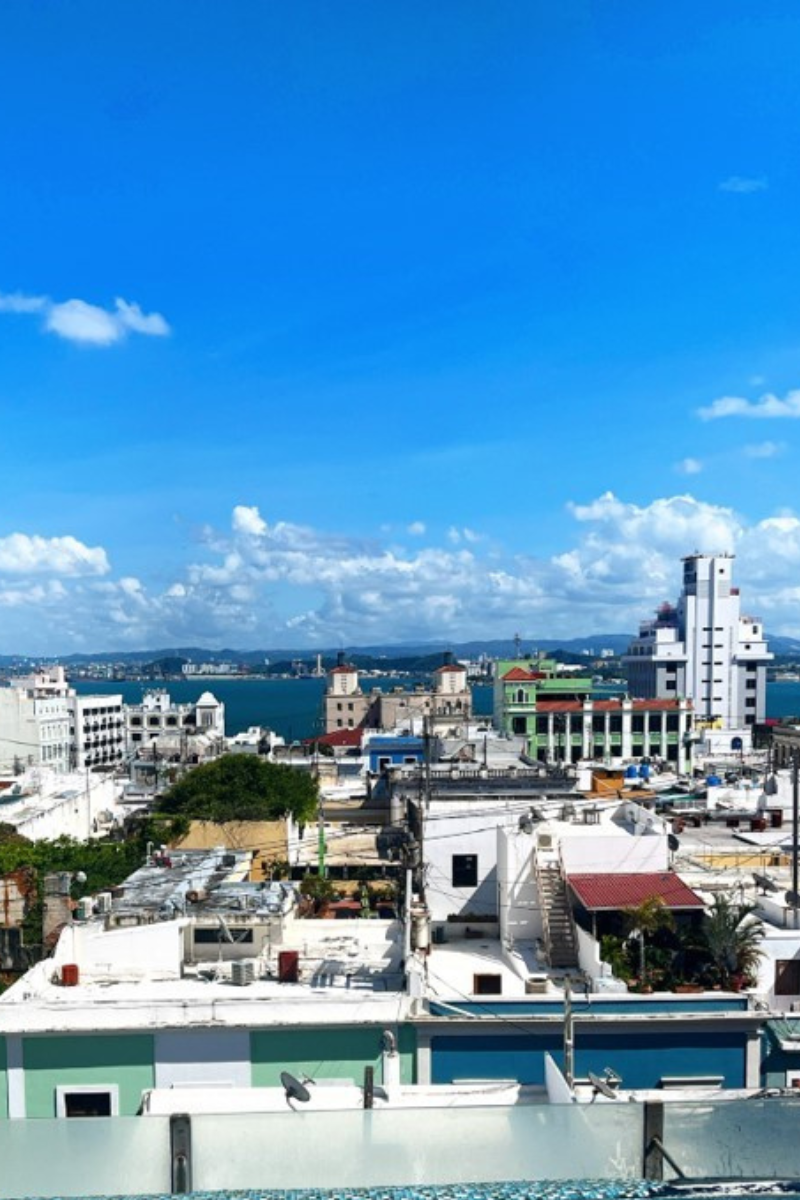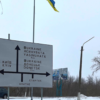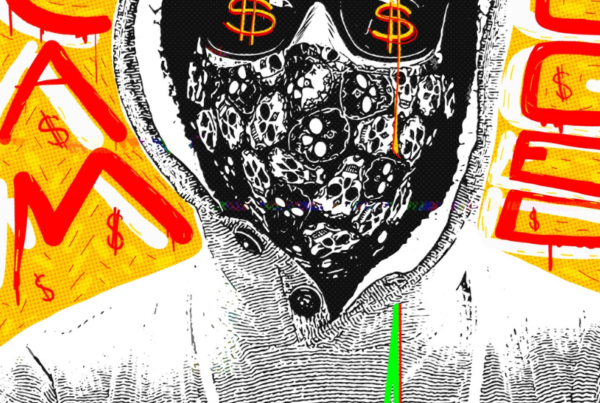SAN JUAN, Puerto Rico – In the middle of a crowded cobblestone street in the heart of Old San Juan, people gather in their work attire consisting of shorts and flip-flops inside a breezy ballroom of an old monastery adorned with stain-glass awnings and high arched ceilings.
It’s owned by former child actor-turned-crypto billionaire Brock Pierce, one of Puerto Rico’s most famous faces in the budding blockchain space.
Inside, the conversations are almost always about innovations, new companies, wallets, and art – but all rooted in the exponentially-growing field of blockchain technology. After all, the small U.S. territory has emerged as a global leader for crypto enthusiasts, blockchain and Web3 innovations, and new discoveries in the developing space in recent years.
“I sold my house and everything in Chicago and came here during the pandemic and never left,” enthuses Nimita Parekh, the Chief Legal Officer for Infinite XYZ, an emerging space for blockchain technologies, NFT communities, and trade. “It took my breath away emotionally, intellectually, and socially. I just couldn’t leave, so I left my entire life behind and started a new chapter here in full swing – and in the crypto space, obviously.”
In addition to the chill Caribbean Island lifestyle, vast aquamarine seas, and secluded beaches reached only by wooden walkways or small seaplanes, its most immense magnetism stems from its unmatched tax incentive under Act 60: no capital gains tax, no federal personal income taxes, and friendly business policies. Businesses can take advantage of an extremely favorable tax environment providing they spend a minimum of 183 days on the island each year. Moreover, given its status as a U.S. territory, qualifiers don’t have to surrender their U.S. passport.

Comparatively, investors on the U.S. mainland pay upwards of 37 percent on their short-term capital gains taxes and up to 20 percent on their long-term ones, applicable to all assets held for more than a year, including cryptocurrency. In addition, businesses on the mainland are held to a 21 percent federal corporate tax and variable state taxes. In contrast, if a company bases its operations in Puerto Rico, its corporate tax rate stands at just 4 percent.
Moreover, Act 60 – which came into play in the summer of 2019 – also includes a provision called the Individual Investors Act, which brings one’s tax commitment down to almost zero under specific qualifying terms. While gains acquired before settling down on Puerto Rican soil are still subject to standard capital gains, with only what is earned after becoming a resident able to reap the rewards, some savvy shareholders are selling their stakes and then repurchasing them in a new position, thus taking full advantage of the Puerto Rican push to become the next American business boom.
For the tropical territory routinely battered by a string of natural disasters, including the devastating Hurricane Maria in September 2016 – Puerto Rican officials are still hopeful for the pro-business climate it has created and all the revenue it can generate.
Just a few months before Maria’s wild winds leveled dozens of buildings and claimed 3,000 lives, the government – unable to pay more than $120 billion in debt due to decades of excessive borrowing, corruption, and mismanagement – filed for bankruptcy. The government of Puerto Rico officially ceased to be in bankruptcy in March of this year, completing the largest public debt restructuring in U.S. history. It has also since announced that it will resume bondholder payments for the first time in years.
Pedro Rivera, a New York City native of Puerto Rican descent, points out that many frontrunners in the Blockchain arena contributed heavily to the ongoing relief efforts in the Maria aftermath, but states that most of those undertakings were intentionally done without any motivation to be publicly recognized.
“That was probably a flaw on our part. We tried to do it with love thinking this is a small place, people would talk about it, they would remember us, they would know we did, and we wouldn’t have to be the ones to go out and talk about what you’re doing. But ultimately, that’s not what took place,” he observes, underscoring that the burgeoning blockchain community didn’t receive much, if any, credit for being an active partner in the relief efforts.
Still, since then, various players have been purporting to build the island up. Pedro, who first learned about blockchain technology while holed up in Miami after a car accident several years ago, now runs “Crypto Mondays,” in which different leaders and enthusiasts gather to learn and network.
“I figured I could do an event where I would have speakers every week and never run out of content. There are so many different, high-quality speakers,” he continues.
Part of that high-quality influx of brilliant thinkers and talented innovators emanates from the tax breaks, Pedro says, but that it isn’t enough.
“That wouldn’t keep people here if they didn’t enjoy themselves, especially when you have a family and schools and a lot to consider,” he opines. “The positive is the island lifestyle. It gives you a really easy, comfortable way of life. Everyone is happy. The negative is that it is slow, which frustrates many people, especially if you come from New York or Miami or San Francisco. So, you get used to it, the trade-offs.”
In this way, with the relatively sudden influx of visionaries – some already successful investors, others launching new businesses, as well as scores seeking funding and opportunities – the number of fascinating projects has increased dramatically.
For one, Dillon Braken intends to decentralize the internet through the blockchain-enabled pkt.cash, an ecosystem of apps. Dillon, who moved to the island in 2020, explains this as an open-source project focused on helping the next billion people get online. He touts the network as the fast-growing, global internet service provider (ISP), powered by the people instead of paying a traditional ISP for internet access.
“Partially, I thought the (tax) advantage was fascinating, but the other part for coming here was that I wanted to be with all the people in the space, the like-minded people,” he notes. “And then there is the sunshine and tropical weather of the Caribbean.”
Jose Ortiz – who hails from California – stresses that many creatives and tech types are busily building the planet’s future in Puerto Rico, and he wanted to do his part. So far, that has come in the form of Helium, a people-powered blockchain for decentralized wireless internet. Users (or “miners”) can set up a simple device in their home or office, provide their town or city with miles of low-power network coverage for billions of devices and earn rewards in a new cryptocurrency.
And then there is Collin Knock, who founded Watch Skins in 2018 and relocated from San Diego to the island in early 2021. The world’s first wearable NFT is currently in talks with multiple brands in different verticals to bring NFTs to smartwatch owners, allowing NFT owners to display their verifiable, authentic assets on their wrists.
“I just felt it was fitting to try to go and immerse myself among a crowd of very enlightened, intelligent, technical people,” Knock says. “And that’s what I found here. I came out for a weekend to check it out prior, and I love the Caribbean. I love the weather and everything that goes along with it. So, it was a simple decision for me.”
Bringing the vast array of thoughts and ideas together for public consumption is Rob Nelson, one of the founders of Roundtable. With a traditional, legacy media background, Rob – who moved to the island last year – saw the need for a decentralized media platform that offers a range of channels and discussions, but also enables individuals to own their content and intellectual property, unlike YouTube, which owns the streaming content.
“The channels represent different things, and the Roundtable brings it all together. The goal is to have conversations we are not having, to get truly independent voices out there which have otherwise been suppressed,” Rob surmises.
In many ways, he continues, Puerto Rico is a throwback to his northern California days at law school in the late 90s, when Silicon Valley was just getting started.
“Puerto Rico is like a little Silicon Valley; it is the perfect environment for new ideas,” Rob tells me, adding that it’s the polestar for innovators developing solutions to all the issues, such as hacking or spending confusion, that deter the average person from starting a crypto portfolio. “Much work is being done to create security and merge crypto into the traditional FIAT space. It isn’t about one replacing the other; it is about new solutions, new possibilities, and a way to enhance existing ones.”
Nevertheless, the arrival of investors and concepts is not without some controversy. Locals do not meet the criteria for the capital gains exemption, which is tailored specifically for non-Puerto Ricans, and thus remain subject to the standard 15 percent rate.
The cost of living is rising along with the flood of business and crypto-wealthy, with everything from food to real estate prices soaring. According to the Federal Housing Finance Agency, home prices, on average, have jumped more than 24 percent over the last few years, raising concerns that locals will be displaced and unable to make ends meet amid the inflation bubble.
The issue is a sore spot with many new residents I speak to, who don’t want to be interviewed for fear of backlash or perpetuating the notion that the ultra-rich are taking advantage of struggling locals.
Still, many insist the blockchain business boom will improve the island for Puerto Ricans. This resilient community has prevailed for centuries, tainted by wars and revolution, colonization, corruption, and climate mayhem.
“We are spending money here. It’s a trickle-down effect, from the restaurants we eat at to the grocery stores, local commerce, and shopping. It has been unfortunate that some have been affected by the collateral damage in the housing market and real estate costs,” Knock acknowledges. “And another way we can help is to create jobs. We need people who will create opportunities and offer high-paying jobs to the locals.”
In turn, the expansion of the community has also attracted a swell of inquisitive locals. The likes of Parekh also oversees various free-of-charge initiatives focused on educating locals about the practical applications of the blockchain world.
Additionally, the company she works for, Infinite XYZ, is building a strategic arm to provide early-stage companies with their strategy, acceleration, or incubation needs as they cement their footprint in the industry’s ecosystem.
“There is a lack of lawyers and access to lawyers in the crypto space, so it is really exciting for me personally. It is an exciting time to be in the space, and the community in Puerto Rico has been helpful. There is a brain trust, a huge and open community where everyone is super supportive and collaborative,” Parekh says. “It is like we are on a group mission to problem solve and proceed in a manner that can benefit us all.”
She calls the crypto clique something of a collective of “unicorns and misfits” with a penchant for disruption – and one that isn’t going anywhere anytime soon.
“After I first set foot here in February of 2021, mid pandemic, when you said cryptocurrencies and blockchain and their eyes would glaze over. Now, even your grandma or neighbor next door understands,” she asserts. “That is a reflection of how fast things are changing and evolving in terms of the mainstream.”
Dillon concurs.
“This is a change in the economy, and the only constant in life is change. I remember when people couldn’t understand the internet and thought it would go away, but came to embrace it eventually,” he adds. “There are many people still trying to bury their head in the sand when it comes to crypto, but they will not be able to do that for long.”











